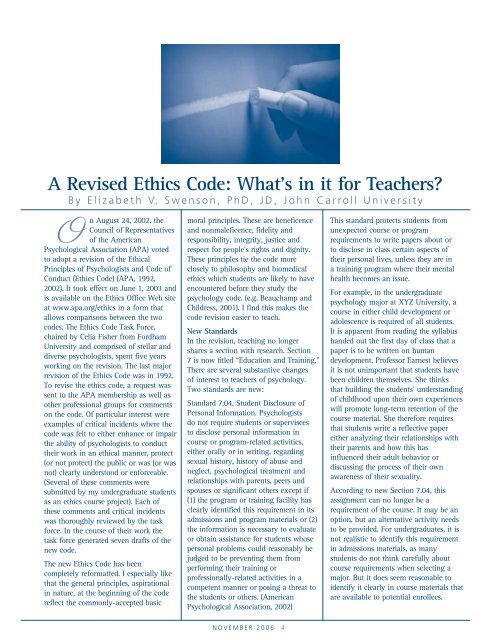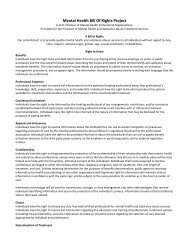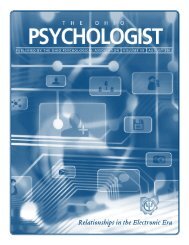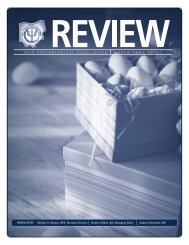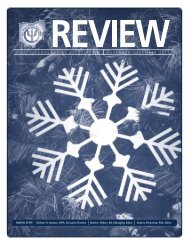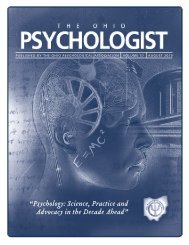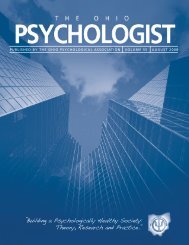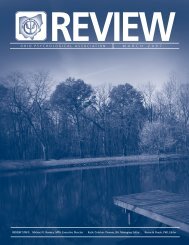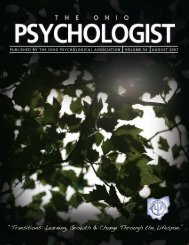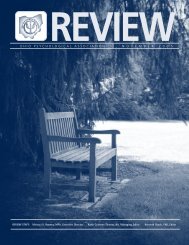A Revised Ethics Code: What’s in it for Teachers?By Elizabeth V. Swenson, PhD, JD, John Carroll UniversityOn August 24, 2002, theCouncil of Representativesof the American<strong>Psychological</strong> <strong>Association</strong> (APA) votedto adopt a revision of the EthicalPrinciples of Psychologists and Code ofConduct (Ethics Code) (APA, 1992,2002). It took effect on June 1, 2003 andis available on the Ethics Office Web siteat www.apa.org/ethics in a form thatallows comparisons between the twocodes. <strong>The</strong> Ethics Code Task Force,chaired by Celia Fisher from FordhamUniversity and comprised of stellar anddiverse psychologists, spent five yearsworking on the revision. <strong>The</strong> last majorrevision of the Ethics Code was in 1992.To revise the ethics code, a request wassent to the APA membership as well asother professional groups for commentson the code. Of particular interest wereexamples of critical incidents where thecode was felt to either enhance or impairthe ability of psychologists to conducttheir work in an ethical manner, protect(or not protect) the public or was (or wasnot) clearly understood or enforceable.(Several of these comments weresubmitted by my undergraduate studentsas an ethics course project). Each ofthese comments and critical incidentswas thoroughly reviewed by the taskforce. In the course of their work thetask force generated seven drafts of thenew code.<strong>The</strong> new Ethics Code has beencompletely reformatted. I especially likethat the general principles, aspirationalin nature, at the beginning of the codereflect the commonly-accepted basicmoral principles. <strong>The</strong>se are beneficenceand nonmaleficence, fidelity andresponsibility, integrity, justice andrespect for people’s rights and dignity.<strong>The</strong>se principles tie the code moreclosely to philosophy and biomedicalethics which students are likely to haveencountered before they study thepsychology code. (e.g. Beauchamp andChildress, 2001). I find this makes thecode revision easier to teach.New StandardsIn the revision, teaching no longershares a section with research. Section7 is now titled “Education and Training.”<strong>The</strong>re are several substantive changesof interest to teachers of psychology.Two standards are new:Standard 7.04, Student Disclosure ofPersonal Information. Psychologistsdo not require students or superviseesto disclose personal information incourse or program-related activities,either orally or in writing, regardingsexual history, history of abuse andneglect, psychological treatment andrelationships with parents, peers andspouses or significant others except if(1) the program or training facility hasclearly identified this requirement in itsadmissions and program materials or (2)the information is necessary to evaluateor obtain assistance for students whosepersonal problems could reasonably bejudged to be preventing them fromperforming their training orprofessionally-related activities in acompetent manner or posing a threat tothe students or others. (American<strong>Psychological</strong> <strong>Association</strong>, 2002)This standard protects students fromunexpected course or programrequirements to write papers about orto disclose in class certain aspects oftheir personal lives, unless they are ina training program where their mentalhealth becomes an issue.For example, in the undergraduatepsychology major at XYZ University, acourse in either child development oradolescence is required of all students.It is apparent from reading the syllabushanded out the first day of class that apaper is to be written on humandevelopment. Professor Earnest believesit is not unimportant that students havebeen children themselves. She thinksthat building the students’ understandingof childhood upon their own experienceswill promote long-term retention of thecourse material. She therefore requiresthat students write a reflective papereither analyzing their relationships withtheir parents and how this hasinfluenced their adult behavior ordiscussing the process of their ownawareness of their sexuality.According to new Section 7.04, thisassignment can no longer be arequirement of the course. It may be anoption, but an alternative activity needsto be provided. For undergraduates, it isnot realistic to identify this requirementin admissions materials, as manystudents do not think carefully aboutcourse requirements when selecting amajor. But it does seem reasonable toidentify it clearly in course materials thatare available to potential enrollees.NOVEMBER <strong>2006</strong> 4
<strong>The</strong> second new standard follows:Standard 7.05, Mandatory Individualor Group <strong>The</strong>rapy. (a) When individualor group therapy is a program or courserequirement, psychologists responsiblefor that program allow students inundergraduate and graduate programsthe option of selecting such therapyfrom practitioners unaffiliated withthe program ... (b) Faculty who are orare likely to be responsible forevaluating students’ academicperformance do not themselves providethat therapy. (American <strong>Psychological</strong><strong>Association</strong>, 2002)This new standard adds a protection tostudents that when psychotherapy isrequired in a particular program orcourse, students may go outside thedepartment to obtain it, and that in nocase will the therapy be provided by afaculty member who might be gradingor evaluating the student. Althoughpsychotherapy is an unlikely requirementfor an undergraduate, consider thispossibility. <strong>The</strong> psychology departmentat ABC university offers a popular coursein Group Dynamics. As the weeks go on,it becomes apparent that the class hasturned into group therapy. As a studentbegins to realize that the focus of thecourse is on self-disclosure andemotional support of ones classmates,she fears that whether she remains quietabout her own problems or disclosesthem to the class, she will be evaluatedpoorly by the instructor. Teachingpsychologists need to be careful thata class does not inadvertently orintentionally become group therapy.Revised StandardsStandard 7.02, Descriptions of Educationand Training Programs, has changedsomewhat from the 1992 Code.Psychologists responsible for educationand training programs take reasonablesteps to ensure that there is a currentand accurate description of the programcontent (including participation inrequired course or program-relatedcounseling, psychotherapy, experientialgroups, consulting projects, orcommunity service), training goals andobjectives, stipends and benefits, andrequirements that must be met forsatisfactory completion of the program.This information must be madereadily available to all interestedparties. (American <strong>Psychological</strong><strong>Association</strong>, 2002)<strong>The</strong> relevant additions here are thewords in parentheses. <strong>The</strong>se add anotherprotection to students that aspects ofa program which might turn out tobe personally threatening or particularlytime-consuming will be disclosedin advance.Standard 7.07, Sexual Relationships withStudents and Supervisees, puts the issueof student/faculty affairs squarely in theteaching section of the Code where itbelongs. In the 1992 Code, this sectionappeared near the beginning of the Code.“Psychologists do not engage in sexualrelationships with students or superviseeswho are in their department, agency,or training center or over whompsychologists have or are likely tohave evaluative authority.” (American<strong>Psychological</strong> <strong>Association</strong>, 2002)But in addition, this revised standardbroadens the prohibition to sexualrelationships with students to includethose who are in the psychologist’sdepartment or over whom thepsychologist has or is likely to havefuture evaluative authority.Revisions Affecting What is TaughtConcerning the subject matter ofteaching, psychologists should be pleasedto see the elimination of the 1992standard 6.04, Limitation on Teaching.This standard made psychologistsresponsible not to teach certainspecialized techniques such as hypnosisto unqualified people.And finally, standard 2.01(a), formerlyStandard 1.04(a), Boundaries ofCompetence, has been changed.“Psychologists provide services, teach,and conduct research with populationsand in areas only within the boundariesof their competence, based on education,training, supervised experience,consultation, study, or professionalexperience.” (American <strong>Psychological</strong><strong>Association</strong>, 2002) Although it wouldseem important for psychologists to onlyteach courses in their areas of expertise,in reality this does not always happen.Especially in small academicdepartments, psychologists are oftencalled on to teach in new subject areas.<strong>The</strong> change in Standard 2.01(a) givesprofessors more leeway to study newmaterial themselves which they areassigned to teach.Overall, the new Code is organized ina more user-friendly manner. <strong>The</strong>thrust of the revisions in the teachingsection are focused more on studentsand learning.ReferencesAmerican <strong>Psychological</strong> <strong>Association</strong>.(1992). Ethical principles ofpsychologists and code ofconduct. American Psychologist,47, 1597-1611.American <strong>Psychological</strong> <strong>Association</strong>.(2002). Ethical principles ofpsychologists and code of conduct.American Psychologist, 57,1060-1073.Beauchamp, T. and Childress, J.(2001). Principles of biomedicalethics, (5th ed.), New York: OxfordUniversity Press.ABOUT THE AUTHOR:Elizabeth V. Swenson, a member ofthe <strong>Ohio</strong> <strong>Psychological</strong> <strong>Association</strong>Ethics Committee, is professor ofpsychology at John Carroll University.She was a member of the American<strong>Psychological</strong> <strong>Association</strong> EthicsCommittee and the APA Task Forceto Revise the Ethics Code. She is alsoan attorney in private practice.Send correspondence to Elizabeth V.Swenson, Department of Psychology, JohnCarroll University, University Heights, <strong>Ohio</strong>44118; e-mail: swenson@jcu.edu.<strong>OP</strong> REVIEW 5


